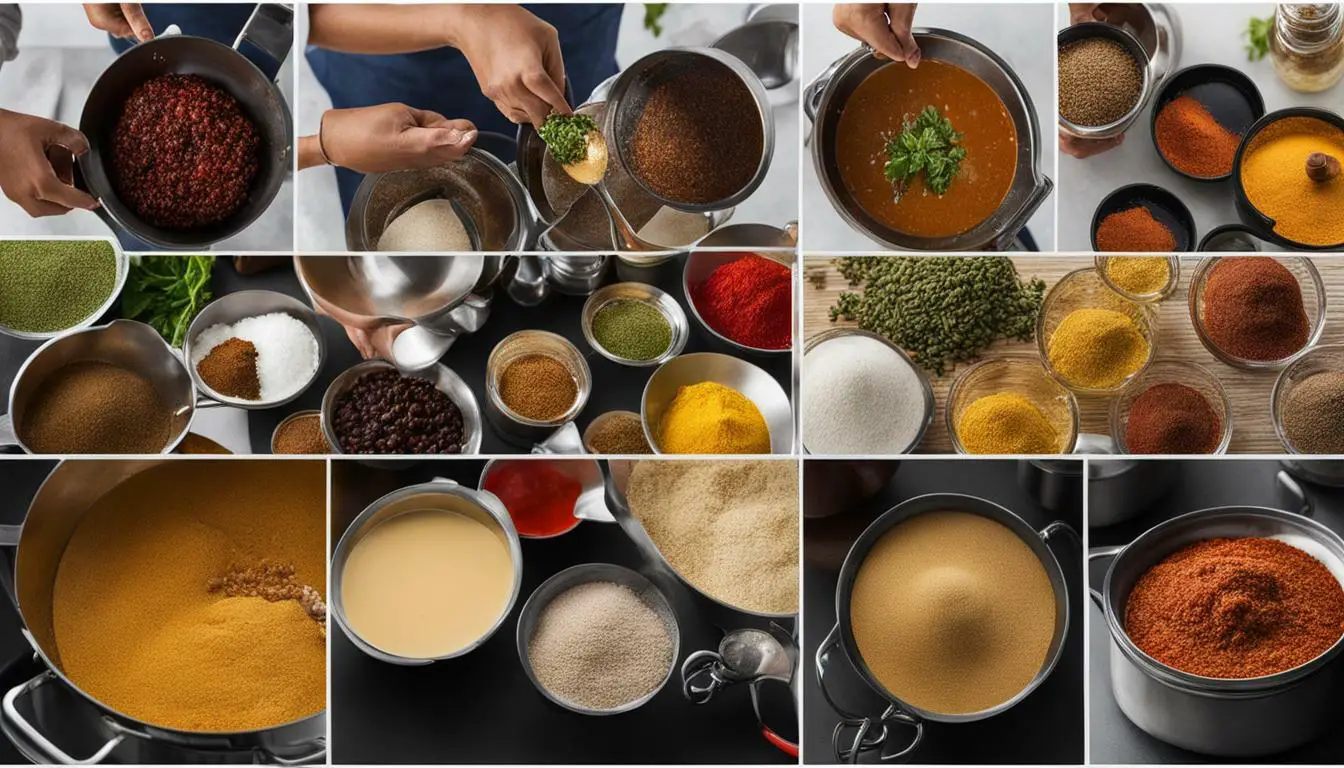
This post may contain affiliate links. Please read my disclosure for more information.
Adobo, the traditional dish of the Philippines, typically calls for vinegar as a key ingredient. However, if you don’t have vinegar on hand, there are several excellent substitutes you can use.
Coconut Vinegar
One ideal substitute for vinegar in adobo is using coconut vinegar, which provides a milder and slightly sweet taste to the dish. Coconut vinegar is a popular choice when it comes to replacing traditional vinegar in adobo recipes. Its unique flavor profile enhances the overall taste of the dish, creating a tantalizing experience for your taste buds.
This versatile ingredient adds a subtle sweetness to the adobo marinade while maintaining the tanginess that vinegar brings. If you’re unable to find coconut vinegar, fear not, as there are other options available to achieve a similar flavor.
Pantry Ingredient Blend
If you don’t have access to coconut vinegar, you can easily create a substitute using a blend of pantry ingredients. Mixing white vinegar with water, white vinegar with white wine vinegar, or white vinegar with cider vinegar can provide the tanginess necessary for adobo recipes. This blend can be adjusted according to your personal taste preferences, ensuring that your adobo remains flavorful.
Creating your own pantry ingredient blend allows you to customize the acidity level of the dish. The combination of different vinegars adds complexity to the flavor profile, resulting in a unique twist on the traditional adobo recipe.
Remember, while these substitutes may alter the flavor slightly, they are still excellent alternatives to traditional vinegar in adobo. Experimenting with different ingredients can lead to exciting and delicious variations, allowing you to enjoy adobo without compromising on taste.
Pantry Ingredient Blend
Another option for substituting vinegar in adobo is to create a pantry ingredient blend of white vinegar combined with either water, white wine vinegar, or cider vinegar. This blend can provide a similar tanginess to traditional adobo, allowing you to still enjoy the flavors of this beloved dish even without vinegar on hand.
To create the pantry ingredient blend, simply combine equal parts white vinegar and your chosen substitute – water, white wine vinegar, or cider vinegar. Start with a small amount and adjust to your taste preferences. Remember, the amount of vinegar in adobo recipes can vary, so feel free to experiment and find the balance that suits your palate.
Creating a Pantry Ingredient Blend:
- Mix equal parts white vinegar and your chosen substitute – water, white wine vinegar, or cider vinegar.
- Start with a small amount of the blend and adjust to your taste preferences.
- Use the pantry ingredient blend as a substitute for vinegar in your adobo recipe.
Using a pantry ingredient blend as a substitute for vinegar in adobo not only allows you to maintain the tanginess of traditional adobo but also adds a unique twist to the dish. It’s a versatile option that can help you create a delicious adobo even when you don’t have vinegar readily available.
Cane Vinegar
For those who can’t find coconut vinegar, cane vinegar can be used as a satisfactory substitute in adobo recipes. Cane vinegar offers a similar acidity and tanginess to traditional vinegar, making it a suitable replacement. This vinegar can be found in many specialty stores or ordered online, ensuring you have a convenient option for your adobo needs.
To use cane vinegar as a substitute, simply swap it in for the vinegar called for in your adobo recipe. Keep in mind that the flavor profile may vary slightly, but it will still provide the tangy kick that adobo is known for. Adjust the amount according to your taste preferences to achieve the desired level of tanginess in your dish.
Why Choose Cane Vinegar:
- Similar acidity and tanginess as traditional vinegar
- Easy to find in specialty stores or online
- Convenient replacement option for adobo recipes
When utilizing cane vinegar as a substitute for traditional vinegar in adobo, you can confidently create a flavorful dish without sacrificing taste. Experiment with the amount of cane vinegar to achieve your desired tanginess level and enjoy the unique twist it adds to your adobo experience.
Sugar Substitute
To maintain the desired sweetness in your adobo dish when substituting vinegar, regular or brown sugar can be used instead of coconut sugar. These sugar substitutes will add a touch of sweetness that is similar to the flavor profile that coconut vinegar provides. The amount of sugar needed may vary depending on personal taste preferences, so it’s best to start with a small amount and adjust as necessary.
If you prefer a lighter sweetness, regular sugar can be used as a substitute. Its neutral flavor will complement the other ingredients in the adobo without overpowering them. Brown sugar, on the other hand, offers a richer and slightly caramelized taste that can add depth to the dish.
Alternatively, coconut sugar can also be replaced with other natural sweeteners such as honey or maple syrup, which can provide a unique flavor profile to your adobo. These natural sweeteners can enhance the overall taste of your dish while keeping it free from artificial additives.
To ensure a seamless integration of the sugar substitute in your adobo, dissolve the sugar in the liquid components of the recipe, such as soy sauce or broth, before adding it to the dish. This will help the sugar blend evenly and contribute to the overall flavor of the adobo.
Conclusion
In conclusion, by utilizing these alternative options, you can still enjoy a tantalizing adobo dish even if vinegar is not readily available. While vinegar is a key ingredient in traditional adobo recipes, there are several substitutes that can be used to achieve similar flavors and tastes.
One popular substitute for vinegar in adobo is coconut vinegar. Known for its milder flavor and hint of sweetness, coconut vinegar enhances the overall taste of the dish. However, if coconut vinegar is not accessible, you can try using cane vinegar instead. Cane vinegar provides a similar level of acidity and tanginess, making it a suitable replacement.
If neither coconut vinegar nor cane vinegar is on hand, fear not. A pantry ingredient blend can be created using combinations of white vinegar, water, white wine vinegar, or cider vinegar. These blends can be adjusted to match your desired flavor profile, ensuring your adobo still has that tangy twist.
For those looking to replace the sweetness that coconut vinegar adds to adobo, regular or brown sugar can be used instead of coconut sugar. Remember to adjust the amount according to your taste preferences. While the substitutions may slightly alter the flavor of your adobo, they can still result in a delicious dish.
FAQ
Can I substitute vinegar in adobo recipes?
Yes, there are several alternatives to vinegar that can be used in adobo recipes.
What can I use as a substitute for vinegar in adobo?
Some options include coconut vinegar, cane vinegar, a blend of pantry ingredients like white vinegar and water, white vinegar and white wine vinegar, or white vinegar and cider vinegar.
Where can I find coconut vinegar?
Coconut vinegar can usually be found in specialty stores or online.
How does coconut vinegar enhance the flavor of adobo?
Coconut vinegar offers a milder flavor and a hint of sweetness, which can enhance the overall taste of adobo.
Can I use regular or brown sugar as a substitute for coconut sugar?
Yes, regular or brown sugar can be used instead of coconut sugar to add sweetness to adobo.
Will using substitutes alter the flavor of adobo?
Substitutes may alter the flavor slightly, but they can still result in a tasty dish. The flavor can be adjusted to match your desired taste preferences.


